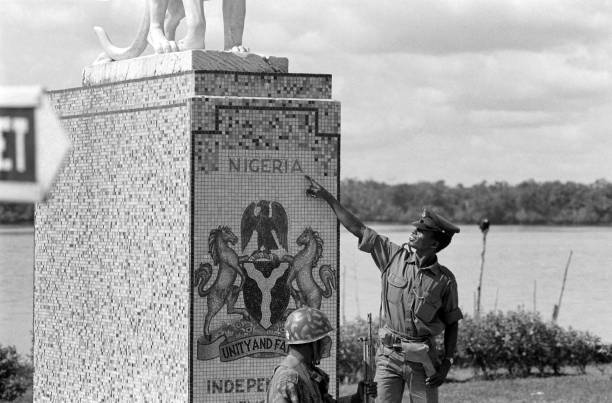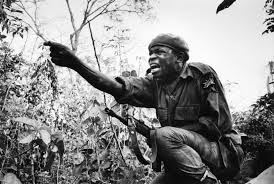The Biafran Genocide, a deeply tragic chapter in African history, remains a poignant reminder of the devastating human cost of war. Between 1967 and 1970, during the Nigerian Civil War, the region of Biafra witnessed immense suffering, including widespread starvation, mass killings, and the displacement of millions. Despite the scale of the tragedy, the victims’ stories have often been overshadowed by political narratives. In this article, we’ll delve into the history of the Biafran Genocide, its causes, its impact, and the lessons we can learn to honor the memory of those who suffered.

Introduction to the Biafran Genocide
1. What Was the Biafran Genocide?

The Biafran Genocide refers to the atrocities committed against the Igbo people of southeastern Nigeria during the Nigerian Civil War, which erupted following the declaration of the Republic of Biafra’s independence. It involved mass killings, forced starvation, and other crimes against humanity.
2. Why Does It Matter Today?
Though the war ended decades ago, its legacy persists. The conflict left deep scars on Nigeria’s ethnic and political landscape, shaping issues of unity and division that still resonate today.
The Road to the Nigerian Civil War
1. Nigeria’s Colonial History
The seeds of the conflict were sown during Nigeria’s colonial period. The British amalgamation of diverse ethnic groups into one nation created deep divisions that would later erupt into violence.
2. Ethnic Tensions Post-Independence
After Nigeria gained independence in 1960, tensions between its three major ethnic groups—the Hausa-Fulani in the north, the Yoruba in the west, and the Igbo in the east—intensified. Political power struggles and economic disparities further fueled resentment.
3. The 1966 Coups
Two military coups in 1966 deepened ethnic divisions. The first coup, led by Igbo officers, was seen by many in the north as an attempt to dominate the country. A counter-coup by northern officers led to the massacre of thousands of Igbo people in the north, prompting many to flee to the southeast.
The Declaration of Biafra and the Outbreak of War

1. The Birth of Biafra
On May 30, 1967, Colonel Odumegwu Ojukwu declared the southeastern region an independent Republic of Biafra, citing the need to protect the Igbo people from further violence.
2. The Nigerian Government’s Response
Nigeria’s military government, led by General Yakubu Gowon, rejected Biafra’s secession and launched a military campaign to reintegrate the region, marking the start of the civil war.
The Atrocities of the Biafran Genocide
1. Mass Killings
The war saw the deliberate targeting of civilians. Reports of massacres, extrajudicial killings, and ethnic cleansing emerged, particularly in areas recaptured by Nigerian forces.
2. Starvation as a Weapon
One of the most harrowing aspects of the genocide was the use of starvation as a weapon. The Nigerian government imposed a blockade on Biafra, cutting off food and medical supplies. This led to a humanitarian crisis, with over a million people, many of them children, dying from starvation.
3. The Role of Propaganda
Both sides used propaganda to rally support and demonize the other. However, Biafra’s images of starving children captured international attention, turning public opinion against Nigeria’s actions.
The International Response
1. Global Awareness
Images of emaciated children in Biafra shocked the world, sparking outrage and calls for humanitarian intervention.
2. Role of Humanitarian Organizations
Groups like the Red Cross and Médecins Sans Frontières (Doctors Without Borders) were pivotal in delivering aid to Biafra, often under dangerous conditions.
3. Political Alignments
Cold War politics influenced international responses. While countries like France and Portugal supported Biafra, others, including Britain and the Soviet Union, backed the Nigerian government.
The End of the War
1. Biafra’s Surrender
After nearly three years of fighting, Biafra surrendered on January 15, 1970. The region was reintegrated into Nigeria, but the scars of the conflict remained.
2. “No Victor, No Vanquished” Policy
General Gowon declared a policy of reconciliation, claiming there were no winners or losers. However, the Igbo people faced significant challenges in rebuilding their lives and communities.
A Must Read for All Poultry Farmers: A Poultry Nutrition Guide
The Legacy of the Biafran Genocide
1. Continued Ethnic Tensions
The war deepened Nigeria’s ethnic divisions, which continue to affect the country’s politics and social cohesion.
2. Advocacy for Justice
Many survivors and advocacy groups have called for recognition of the genocide and justice for its victims.
3. Inspiration for Separatist Movements
The memory of Biafra remains a rallying point for separatist movements in southeastern Nigeria, including the Indigenous People of Biafra (IPOB).
Remembering the Victims
1. Memorials and Tributes
Efforts to memorialize the victims include annual remembrance events, monuments, and artistic works that honor their memory.
2. Documenting Survivor Stories
Survivors’ accounts play a crucial role in preserving the history of the Biafran Genocide and ensuring it is not forgotten.
3. The Role of Education
Incorporating the history of Biafra into Nigeria’s educational curriculum is essential for fostering understanding and preventing future conflicts.
Lessons from the Biafran Genocide
1. The Cost of Ethnic Divisions
The genocide underscores the dangers of ethnic tensions and the need for unity in diversity.
2. The Importance of Humanitarian Aid
The international response highlighted the need for effective and timely humanitarian interventions in conflict zones.
3. Building Lasting Peace
The aftermath of Biafra demonstrates the importance of reconciliation, justice, and inclusive governance in healing a nation.
Conclusion: Honoring the Forgotten Victims
The Biafran Genocide is a stark reminder of the devastating consequences of war and division. By remembering the victims and learning from their suffering, we can work toward a future where such tragedies are never repeated. Their stories must not remain in the shadows; they deserve to be told, understood, and honored.
Also Read; The Evolution of Fashion Trends: A Look Back at the Last Decade
FAQs
1. What caused the Nigerian Civil War?
The war was triggered by ethnic tensions, political power struggles, and the declaration of Biafra’s independence in response to the massacre of Igbo people.
2. How many people died in the Biafran Genocide?
It is estimated that over 2 million people, primarily civilians, lost their lives due to starvation, disease, and violence during the conflict.
3. Was there international intervention during the Biafran Genocide?
While humanitarian organizations provided aid, political considerations during the Cold War limited direct international intervention in the conflict.
4. How is the Biafran Genocide remembered today?
The genocide is remembered through memorials, survivor accounts, and advocacy for justice. However, many believe it has not received the recognition it deserves.
5. What lessons can be learned from the Biafran Genocide?
Key lessons include the need for unity, effective conflict resolution, and the importance of addressing ethnic and political grievances to prevent future violence.


